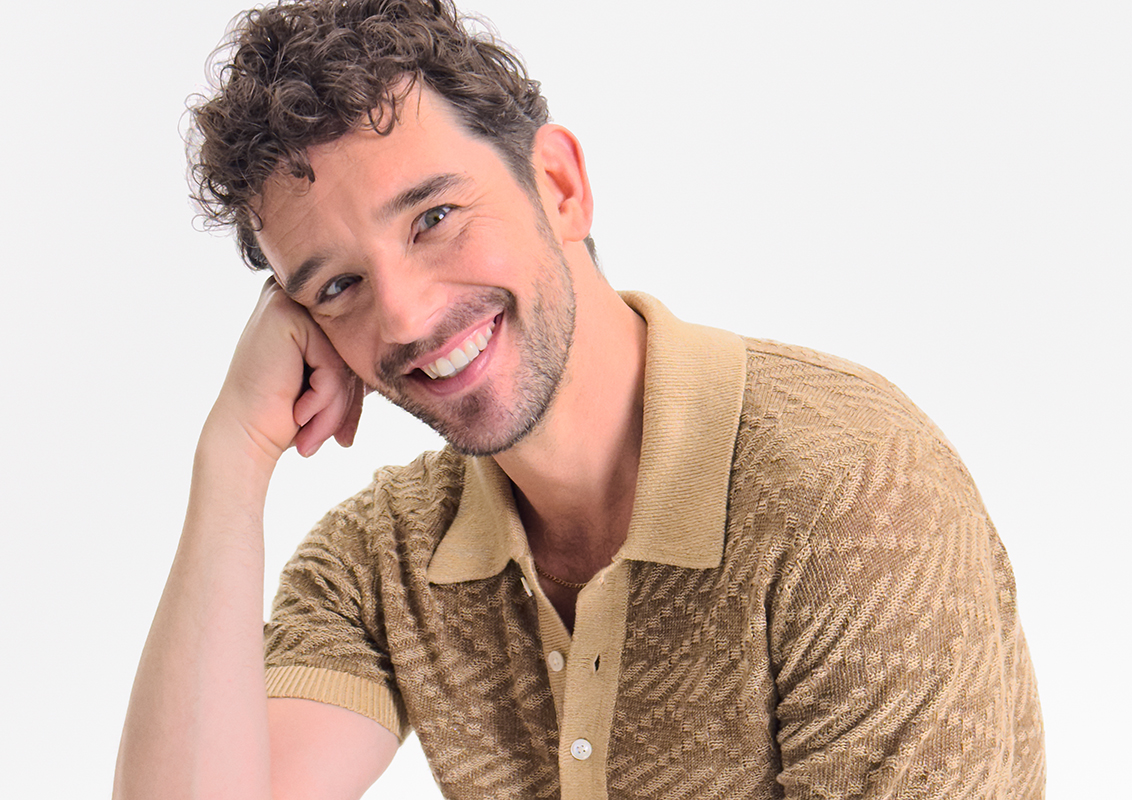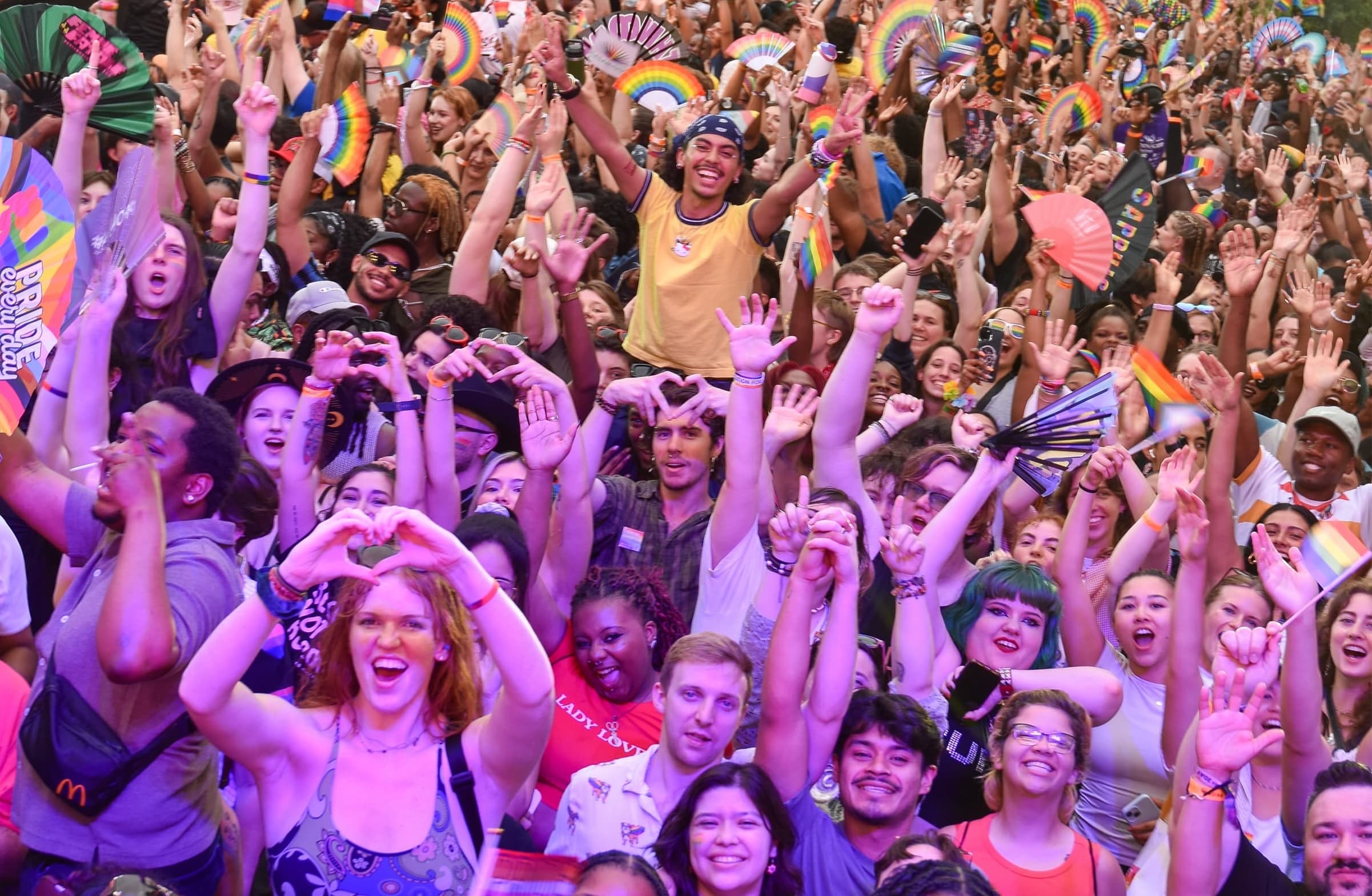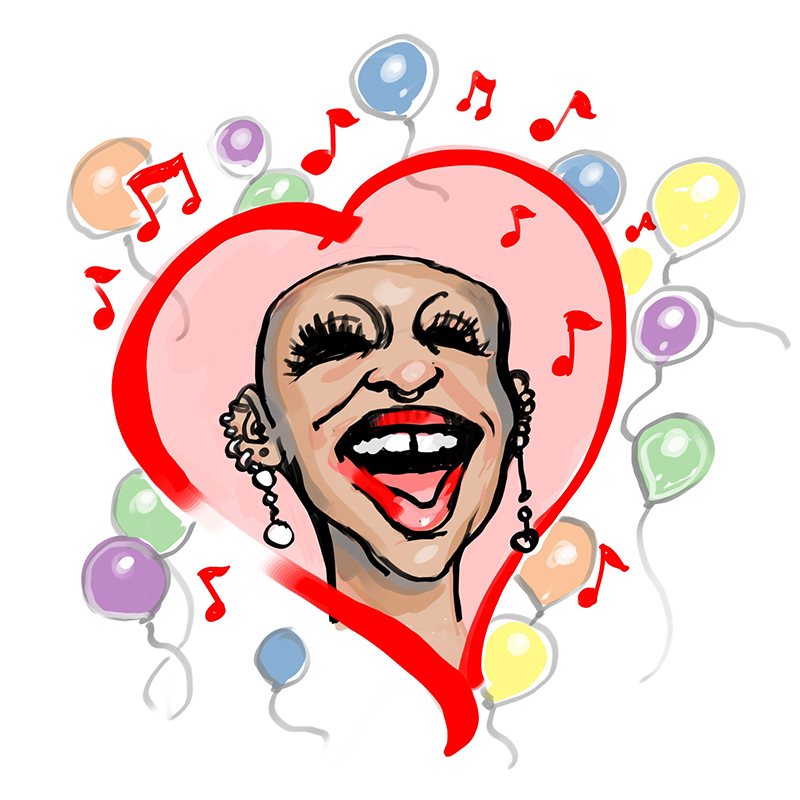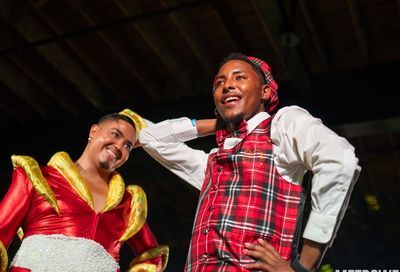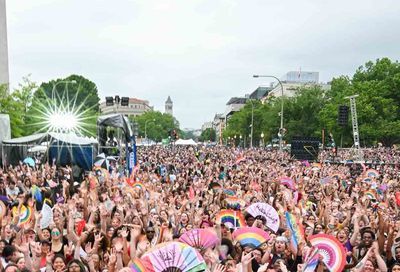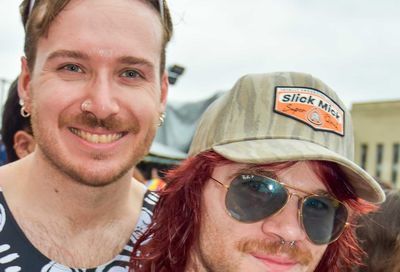Home Team
In a packed field, Michael Brown aims to break out by targeting the growing divide between haves and have-nots
The fourth in an occasional series of interviews and stories on the 2006 D.C. mayoral race.
Michael A. Brown likes to get around the city. He easily reels off the list of the places he’s campaigned in the gay community — Fireplace, Club 55, Annie’s, Cobalt, just to name a few — from dusk ’til dawn. He’s been a familiar face at candidate forums, community meetings and major events. It’s all part of his quest to be mayor of his home town.
A third-generation Washingtonian, Brown remains in the city of his youth with his wife, Tami, and their 13-year-old twin sons. Given his height, it’s not surprising to learn that he was an accomplished basketball player in both high school and college — though he smiles with some self-deprecation when noting that, ”Duke and North Carolina weren’t knocking my door down.”
The team competition of basketball may have been Brown’s youthful athletic passion, but it’s golf that’s shaped his adult life. He learned the slower-paced game while playing with his grandfather.
 Brown |
”I’ve been playing golf since well before it was fashionable — or at least my grandfather had me in the woods looking for his golf balls,” Brown laughs. He says the game gave him an even-keeled approach to life.
”If you hit a great shot, you can’t get too excited because you have another shot to hit. If you hit a bad shot, same philosophy. I’m extremely competitive, but I don’t get too excited when good stuff happens and I don’t get down when bad stuff happens. I just try to stay right in the middle.”
The son of the late Ron Brown, who headed the Democratic National Committee and served as Secretary of Commerce under President Bill Clinton, Michael Brown is quick to mention the influence his father had on his development, particularly the imperative to take on problems himself, not wait for others to take action. He says that’s what drove him to take on a campaign for mayor.
”I saw what was going on in my city,” he says. ”Things are going wrong and I shouldn’t wait for someone to solve it. I should run for mayor and solve it myself.”
As the Sept. 12 primary approaches and frontrunners are anointed in polls, Brown says the race is exactly where he wants it.
”I love the field the way it is right now,” he says. ”It will be between Linda [Cropp] and me coming down the stretch.”
He acknowledges that it’s not an easy task, but that it’s the nature of the game — everything from high-level political dust-ups to dealing with the minor confusions of a candidate in a different race who shares his name. But for Brown, it all comes to down to getting out and about in his hometown.
”We don’t have the resources to do all the TV commercials [and] buy a million ads, so we have to do it in the street,” he says. ”And as long as we’re doing what we’re supposed to do, I think we’re going to be tough to beat.”
METRO WEEKLY: What was your childhood like, growing up in D.C.’s Shepherd Park neighborhood? What was it like then compared to now?
MICHAEL BROWN: That kind of goes right to the reason I’m running for mayor. We used to have an extremely economically diverse city with a very strong and vibrant middle class made up of all kinds of people. My street had a doctor, lawyer, police officer, plumber, business people, white, black, Asian, Latino. Everyone went to Shepard Elementary School, and everyone else’s parents watched out for everyone else’s children.
What concerns me now is that the city leaders seem to be enamored with attracting a certain kind of person into the city and I don’t like that. I think it’s hurting our diversity as a city when you just want one type of person — [it’s] eliminating the middle class and clearly not caring about the poor. The first signal for me that there was a contempt for poor people in this city was when D.C. General [hospital] closed. D.C. General never should have closed in the first place. It should have been fixed. And that was the first signal that these particular leaders had a plan to get most of the low end of the economic totem pole out of the city.
MW: How did your childhood and neighborhood influence who it is that you are now?
BROWN: The neighborhoods then had old-school values. The bookmobile coming through the neighborhood, Schoolhouse Rock on ABC every morning, sleepovers in the neighborhood, and other parents had the right to discipline you. When you get home from school you do your homework first before you do anything else. Some of those old core values that we’ve missed in our communities now. Our senior citizens used to sit out on the porches. If I was doing something I was wasn’t supposed to do, someone would tell me to stop. If my mother came outside looking for me, she could ask 15 people where I was and all 15 would know. There were certain values instilled in folks that lived in the city in the ’70s and early ’80s that seem to have vanished. That’s why it’s such a struggle for me as I raise my children. We’re fortunate that we live in a neighborhood where they do have friends and they do have sleepovers and the parents have the right to discipline their kids, but there are a lot of neighborhoods now that don’t have that.
MW: Your father was obviously politically involved. Did that account for a difference between your experience in D.C. and the experiences of other local families?
BROWN: When I hear people compliment my father on the great stuff he has done, I acknowledge it, but I don’t hear [those things] in my head. What I hear is, ”Clean up your room,” ”Take the dog out,” ”Don’t mess with your sister,” things like that. But when you’re around politics your whole life it’s clearly something you gravitate towards. In this particular case, I gravitated towards politics and public service.
MW: What was the first time that a gay or lesbian person came out to you?
BROWN: I was actually very young. I had a very good friend in my neighborhood who happened to be gay — we were about 12 or 13-years-old. I don’t think he said, ”Oh, by the way, I’m gay.” It wasn’t like that. It was always a part of who I was and the kind of folks in my neighborhood.
My first job out of law school I shared an office with an extremely talented, smart man who happened to be gay. I remember our first conversation — we had to draw straws for who got the window seat. Then we talked about our personal lives, and he said, ”By the way, I’m gay.” We didn’t stop the conversation, he didn’t have to explain anything — that’s part of life. It’s nice when you get to be introduced to different kinds of people. People are just different. Orientations are different. I was raised to respect that. For me, and I think that’s one of the reasons I have connected so well in the gay and lesbian community in the city. No one ever had to sit down with me and say, ”Okay, here’s how you talk to a gay person.”
MW: You had a fairly open experience when you were young. When did you first understand that not everybody felt the same way?
BROWN: Almost instantly. You have some people that were raised a little differently and the teasing starts. Obviously, there’s too much bigotry so it didn’t take long at all. Shepard Park wasn’t utopia. It was nice that we had diversity but clearly there were still some social issues that affected a lot of people’s lives.
MW: I was recently told of a person who, at 16th Street and New Hampshire Avenue, had people jump out of a car and start calling him faggot and harassing him. I’ve had people call me faggot while walking down 16th Street, and in other areas of the city. If you were mayor, is combating that something you can have a role in?
BROWN: Absolutely. The mayor of any city has the ability to set the tone, set the environment. Either you’re going to tolerate it or you’re not, and I’m going to be a mayor that’s not going to tolerate it. No one should be discriminated against. It’s unacceptable.
I’m going to set that tone, and that includes sensitivity training. That has to happen not just in the Metropolitan Police Department, it has to happen in our schools. Groups like SMYAL [Sexual Minority Youth Assistance League] and Metro Teen AIDS do so much good work with gay young folks who have nowhere to go. [Those youth] should be able to go to their schools and get the comfort they need. That’s why these organizations exist. So sensitivity training in school is going to be a big part of it. After I become mayor, we’re going to introduce a whole new set of curriculum on the social side, from sexuality discussions to civics, home economics — a host of things, back to those old-school values.
MW: You mentioned that one of the reasons you got into the race was because of your concern that the city was trying to attract a particular type of person, and as a result lower middle-class people are getting pushed out. When you talk about gentrification, a lot of times gay people get pulled into the debate due on the stereotype of being gentrifiers: people with extra money, no kids, moving in and driving up property values. When you say that you’re not happy with the city trying to pull in ”a certain type of person,” some gay people may think that they’re the type of people you’re talking about.
BROWN: I don’t think so. Clearly, with any message there could be some people who can feel excluded. But my message is relative to the city leaders — it’s like they feel they have to make a decision on what kind of people they want in the city, when you can have both. Frankly, [right now] we’re almost making a choice that senior citizens have to go, poor people have to go, African Americans have to leave the city, and that’s not true. I love that new folks are coming in. I don’t want to put walls up. I think diversity is great. But it shouldn’t be at the expense of [other] people and that’s the decision that these city leaders are making. Look at Thomas Circle and Logan Circle as examples — gentrification can be a good thing. It’s not always a bad thing. It just has to be done responsibly. These leaders haven’t done it responsibly.
MW: With property values going up all across the city, how do you propose, keeping those different socio-economic groups within the city and keeping lower-income people from having to move out?
BROWN: First of all, there is no higher residential property rate in America than New York City. Police officers live in the city, teachers live in the city, firefighters, EMS workers, small business owners — because there is a commitment to having economic diversity in New York City. David Dinkins endorsed me about a month-and-a-half ago and he’s been walking me through how you make that happen.
Teachers can’t walk into our banks anymore and get a loan. [Ward 1 Councilmember] Jim Graham comes up with some of the best, most aggressive rental control legislation maybe in this country’s history, and a couple of people who are running against me voted against it. Their commitment is not there — you have to make sure the leader says ”I want economic diversity in the city.” That’s how you start making it happen.
This city is almost forcing developers to buy land at premium rates. The city assessor will come by and say the property is worth $15 million dollars — and what happens is that developer has to go get financing to put up condos. They have debt they have to pay if they want to make some money, so they almost have no choice but to charge $900,000 for a condo. What I would like to do is almost give them the land or provide some creative financing techniques, and say, ”I don’t care what you charge for the top three floors of condos — charge a million dollars or 10 million dollars. But for the middle and lower floors, I want our teachers to live there, our firefighters, because we need to rebuild our middle class in this city.”
The mayor and the leadership of the City Council are frankly so enamored with getting rich people into the city — they have forgotten that cities are not financially successful because of how many rich people you have. They’re successful because of how strong the middle class is. That’s what I’m going to change when I’m mayor.
MW: You brought up New York City as an example. Does that include a teacher who works in Manhattan but lives in Queens?
BROWN: No, absolutely not. That’s a fallacy. You have Wall Street bankers who live on the East Side and there are rent-controlled buildings two blocks away for teachers and firefighters. So if you want to do it, you can. This city doesn’t want to do it. But more important than what you want your city to look like, it doesn’t make financial sense to have just one kind of person, either having a bunch of haves and a bunch of have-nots and no middle class.
MW: What are your thoughts on marriage equality for gays and lesbians?
BROWN: I’ve been extremely clear. I’m a Democrat and proud to be a Democrat. And so, personally, I’m clearly for marriage equality. I think that’s the right position. However, as your leader, we have to be honest with the citizens. We aren’t a state and we don’t have the power either legally or politically to make that happen without Congress. And this particular Congress will never sign our budget [if D.C. enacted gay marriage rights]. It just wouldn’t happen. So for leaders to stand up and talk about what they can and will do is, I think, a little disingenuous, because they can’t do it. It’s like a commuter tax: People can stand up and talk about a commuter tax all day long, but we don’t have the political or legal leverage to tax anybody. So let’s talk about how we can make civil unions as strong as possible. You just don’t call it marriage, because once we call it that, the red flag goes up and the environment changes.
MW: What are the primary reasons that the gay and lesbian community should want you to be mayor?
BROWN: It’s not even close, the kind of involvement I’ve had in the gay and lesbian community relative to going to particular clubs and events and not being afraid. I’m not afraid of my own people and I’m not afraid of people who are different from me. These other folks that are running [for mayor] may go to particular things, but the kind of places I go, no one else goes. I’m always complimented on, ”I can’t believe you had the courage to come here. I can’t believe you have the courage to go there. You’re everywhere in our community.”
|
I was raised that you treat everyone the same: You’re not above anyone else, you’re not beneath anyone else. So in this campaign season, it’s very easy when my gay outreach folks say, ”Michael, you need to be here at 2 in the morning.” Okay, I’ll be there. Whether we’re at Fireplace, or having brunch at Annie’s, or if I’m judging a drag contest at Club 55, it doesn’t matter what your orientation is, what the color of your skin is, how much money you make, or what part of the city you live in. If you’re a resident of the District of Columbia, you should have the exact same access to your leaders as everyone else, but you should also get the same resources as everyone else, too.
MW: What was the first time you actually talked to or met someone who was transgender?
BROWN: I had engaged with a lot of folks who are transgender through the Democratic party and that’s when I was really young. It just wasn’t a shock to me. It’s just that a particular person is different than I am. On the formal side, when [transgender activist] Ruby [Corado] and I started chatting about the mayoral race she explained to me the different challenges. So again — listen, learn and respect. From my standpoint, it was helpful that I come from a place where I was always open-minded anyway, so when Ruby and I started having our conversations, she didn’t have to reinvent the wheel with me.
MW: What are your thoughts about the religious opposition we’ve been seeing to gay issues?
BROWN: When you look at the divisions in this city — between our Latino day laborers and African-American day laborers, between our gay and lesbian community and our churches, between the haves and the have-nots — there are divisions everywhere. And they’re not new. These things have been festering for a while and our leadership didn’t do anything. When I’m mayor, we’re not going to agree on everything, and that’s okay. But let’s find the nine things out of 10 we do agree upon so we can get to that tough tenth one.
What happens now is that people have drawn these lines in the sand, people make comments and it’s just very divisive. And that kind of divisive talk is not healthy for anyone. I’m not saying people can’t have their own opinions, you clearly can. As powerful as a mayor or a president may be, you can’t change anyone’s opinion. However, we all live in this city together. We have to respect each other and that’s what I want to bring to being mayor, that people respect each other.
MW: There’s been some controversy along the 9th Street corridor over the opening of a new gay bar, Be Bar, which was opposed by one of the large local churches. How would you balance support for churches and religious organizations on one hand with the support for gay businesses on the other?
BROWN: First, I think there are so many different issues relative to race in this city that we have to start talking about. I think right under that very thin layer is a lot of race issues. However, Be Bar is going to be patronized by a lot of other folks besides white gay males. The African-American gay community is going to love Be Bar. But more importantly, dialogue has to happen between where these folks are divided. You have to get people in a room and say, ”Hey, how can we work this out? How can we make it where we’re all living in the city together?”
I understand the issues [involved here], but there is a larger issue from my standpoint. You go out on Benning Road and there’s a library the size of this room, but there are liquor stores on every corner. Let’s look at the bigger picture of what’s happening in our city and what our young people are looking at. I don’t want them to see strife between church and a particular constituency group. I want us to fight battles together. Look at all the liquor stores in the community. Look at all the fast food restaurants, but no grocery stores. People can’t even eat a salad in far Northeast because there’s nowhere to buy it. I would rather focus on the bigger picture stuff, and find ground on fixing those rather than little disputes relative to whether a bar is going to go into a neighborhood or not.
MW: You have served on the Whitman-Walker Clinic board of directors. How did you get involved with that?
BROWN: They invited me — they told me that I was the second African-American heterosexual male to ever go on the board, and I was proud of that. But more importantly, what they asked me to do was to start talking a lot about changing the stigma of who HIV and AIDS affects. There was always the idea that it affects ”them, them, them” when it affects ”us, us, us.” That was my job, basically, [talking about how] it touches all of our community. And frankly, now that numbers show that we rank 11th in the world and one out of seven males of color in this town are infected, it is not just about a gay and lesbian issue — it is an issue that touches all of us.
[The HIV/AIDS group] D.C. Fights Back graded all of the [mayoral candidates] and I got an A-, the best grade. It’s an important issue. President Bush talked about weapons of mass destruction. There’s no greater weapon of mass destruction than disease and economic disparities and poor education systems. I’d call for a state of emergency as a matter of fact, 10 days after I become mayor, to really take it seriously because the numbers are so astronomical. I want to distribute condoms in schools. I think needle exchange is important. We need to talk about education and treatment. So when you put all of that into the mix, those are fights I’m looking forward to having with Congress. ”You can’t distribute condoms in schools.” Well, stop me! We’re losing babies every day. We’re losing our young people every day and yes, I’m not promoting drug use but right now every time someone uses a used needle they may get infected. So those are fights I look forward to.
MW: Obviously, needle exchange has been perpetually blocked by Congress. Do you have any idea how to break that block?
BROWN: Well, again, you have to build some coalitions. There are some folks in Congress that love needle exchange. I’m going to find them first. And that’s how I’ll start to build our coalition. I understand [the] concern about promoting drug use. When you have folks who are users we need to get them in treatment centers, we need to get them educated so they understand the consequences. But in the meantime, we have to do needle exchange, otherwise the infection rate is going to continue.
MW: If you just want to say one thing to the gay and lesbian community about why they should vote for you, what would that be?
BROWN: Clearly, you can trust me. You can trust that I will have the courage to stand with you. A couple of folks who are running against me have different messages in front of different people. Some folks go in front of the gay and lesbian community and brag about how they’re pro-marriage — then they get in front of African-American ministers and they say they’re not. That’s not courage. Or they change their position mid-stream, thinking that’s going to help them.
You have to have conviction and courage about different constituency groups, in particular the gay and lesbian community, and that’s why I think it’s interesting. The gay and lesbian community isn’t monolithic. Is gay marriage the only thing you care about? No. You want safe streets, too. You want kids to be educated, you want to be able to afford to live here, you want to have a great quality of life. I think what’s happened is that a lot of folks running against me thought that marriage is the litmus test. And it isn’t. So from my standpoint, it’s about trust and courage.
Michael Brown’s Web site is www.brownformayor.com.
Support Metro Weekly’s Journalism
These are challenging times for news organizations. And yet it’s crucial we stay active and provide vital resources and information to both our local readers and the world. So won’t you please take a moment and consider supporting Metro Weekly with a membership? For as little as $5 a month, you can help ensure Metro Weekly magazine and MetroWeekly.com remain free, viable resources as we provide the best, most diverse, culturally-resonant LGBTQ coverage in both the D.C. region and around the world. Memberships come with exclusive perks and discounts, your own personal digital delivery of each week’s magazine (and an archive), access to our Member's Lounge when it launches this fall, and exclusive members-only items like Metro Weekly Membership Mugs and Tote Bags! Check out all our membership levels here and please join us today!








